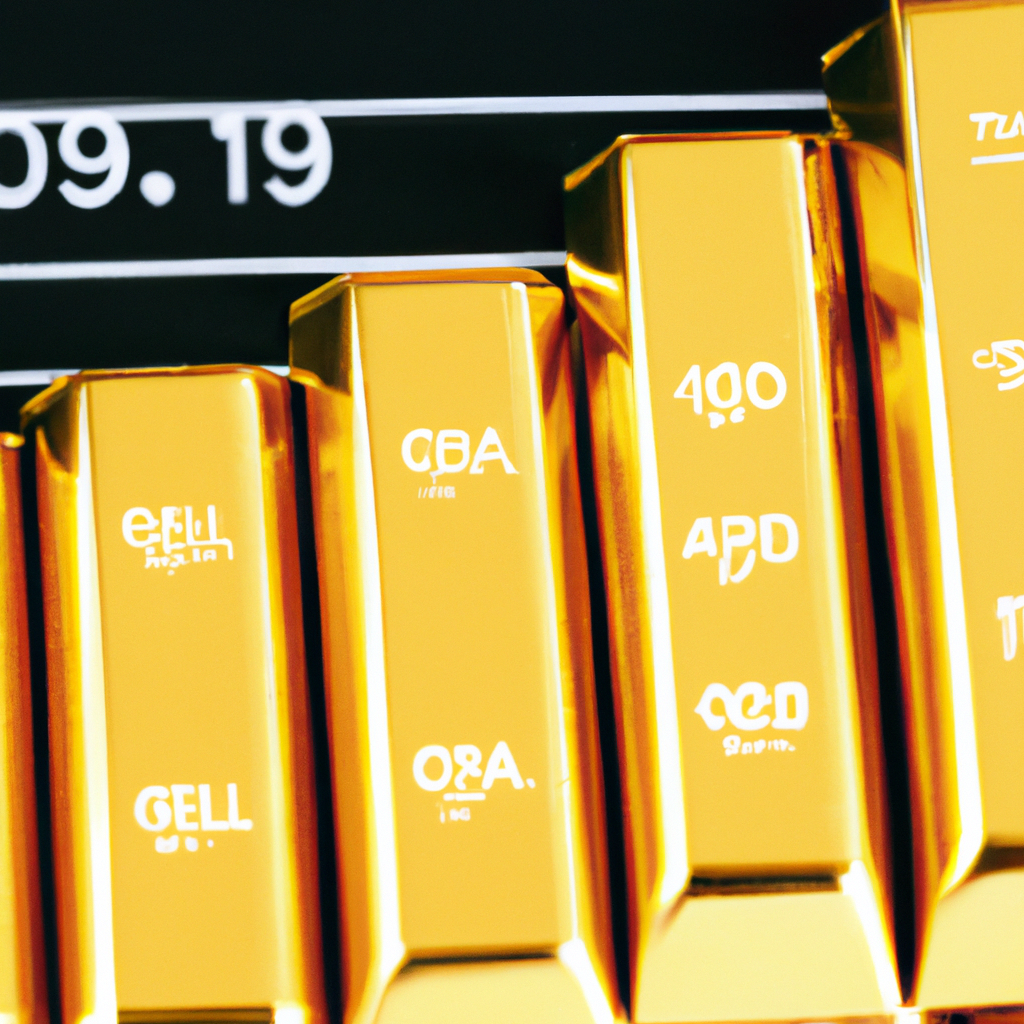In “Gold Price Volatility: Strategies For Timing Your Investments,” you’ll find a comprehensive guide tailored just for you, offering valuable insights into the world of investing in the precious yellow metal. This guide is designed to help you navigate the fluctuating market, mastering the strategies needed to optimize the timing of your investments. It’s a treasure trove of knowledge specifically crafted to mitigate your risk while maximizing your returns. Get ready to empower your investment journey with an edge that only a few can master.
Understanding Gold Price Volatility
Just as any other market asset, the price of gold does not remain constant. It can shift up and down moment by moment due to various factors. This is referred to as gold price volatility.
Definition of Gold Price Volatility
Gold price volatility refers to the rate at which the price of gold increases or decreases for a set of returns. It is a measure of the dispersion of returns for a given security or market index. Simply put, volatility refers to the amount of uncertainty or risk about the size of changes in a security’s value, and it’s used to gauge the fluctuations in the price of gold over time.
Causes behind Gold Price Fluctuations
Several factors contribute to gold’s price fluctuation. Supply and demand, negative real interest rates, uncertain economic times, central bank policy, and inflation are among the top factors. Geopolitical instability and crises also often trigger a rush of investment into gold, propelling prices higher.
Historical Trends of Gold Price Volatility
Looking back on the historical trends of gold prices, you may notice several peaks and valleys. The highest ever price of gold was recorded in August 2020, amidst the global uncertainty brought about by the COVID-19 pandemic. There were significant jumps during the 2008 financial crisis and during periods of high inflation in the 1970s too.
Importance of Gold as an Investment
Gold is often considered a reliable investment. Its ability to retain value and act as a safety net during economic downturns makes it highly attractive to investors.
Role of Gold in Portfolio Diversification
Gold plays an important role in portfolio diversification due to its low correlation with other assets. It is considered a defensive asset that can potentially provide protection against losses when other investments are performing poorly.
Gold as a Hedge against Inflation
Gold is often touted as a hedge against inflation. In periods of high inflation, many investors flock to gold as a so-called ‘safe haven‘ as it tends to maintain its value when the purchasing power of currencies decline.
Impact of Market Conditions on Gold Investments
The performance of gold investments is heavily influenced by market conditions. In times of economic uncertainty, gold prices typically rise due to increased investor demand. Conversely, if the economy is performing well, gold prices often fall as investors switch to riskier assets with potentially higher returns.

Analyzing Gold Market Trends
To make informed decisions about gold investment, understanding market trends is key.
Understanding the Gold Spot Market
The gold spot market is where gold is bought and sold for direct delivery, as opposed to future delivery. It’s important to monitor the spot price of gold, as it represents the most accurate rating of gold at any given time.
Following Gold Futures and Options
Gold futures and options contracts can provide insights into future expectations of gold prices. By investing in these derivatives, investors can protect themselves against potential gold price fluctuations.
Identifying Market Signals in Gold Investment
Identifying the right market signals is crucial to successfully invest in gold. This may include analyzing economic indicators, such as inflation, interest rates, and geopolitical events that may impact gold prices.
Strategies for Timing Gold Investments
When investing in gold, one of the many important decisions you have to make is timing.
Buy and Hold Strategy for Gold
One standard strategy for gold investing is the ‘buy and hold’ technique. This involves buying gold and holding onto it for an extended period, irrespective of fluctuating prices, with the expectation that prices will increase over time.
Contrarian Investing in Gold
Contrarian investing involves going against current market trends. This could involve buying gold when prices are low or selling when prices are high.
Dollar Cost Averaging in Gold Investment
Dollar-cost averaging involves investing a fixed amount in gold at regular intervals. This allows investors to mitigate the risk of market volatility by spreading out their purchases over time.

Use of Technical Analysis in Timing Gold Investments
Technical analysis is a vital tool in timing your gold investments by studying statistical trends gathered from trading activity, such as price movement and volume.
Understanding Gold Price Charts
Gold price charts offer a visual representation of gold’s price history. Analyzing these charts can help predict future price movements.
Using Gold Investment Indicators
Several indicators can provide insights into gold’s potential price movements. Volume, moving averages, relative strength index (RSI), and gold volatility index (GVZ) are popular indicators among gold investors.
Evaluating Gold Market Trends using Technical Analysis
Technical analysis helps evaluate market trends, enabling investors to make informed decisions about when to purchase or sell gold securities. This can be achieved by recognizing chart patterns or using technical indicators to provide signals for trading opportunities.
Utilizing Economic Indicators to Predict Gold Price Movements
Economic indicators can play a pivotal role in predicting gold price trends.
Connection between Gold Prices and Inflation
Higher inflation often increases gold prices. Since gold is typically viewed as a safe-haven asset, investors tend to flock to gold during periods of high inflation.
Impact of Interest Rates on Gold Prices
Gold prices often move inversely to interest rates due to the opportunity cost of holding gold. When interest rates increase, investors may opt for interest-bearing assets over gold, pushing gold prices down, and vice versa.
Effect of Global Economic Events on Gold Value
Global economic events can significantly influence gold prices. For instance, during economic crises, people often turn to gold as a store of value, increasing its demand and price.

Risk Management in Gold Investments
Successful gold investing involves not only understanding the market dynamics but also adequately managing your investment risks.
Need for Portfolio Diversification
Portfolio diversification is key to decrease risk in gold investment. It involves spreading your investments across various asset classes, including gold, to reduce exposure to any single asset.
Utilizing Stop Loss Orders for Gold Investments
Stop loss orders are used to limit an investor’s loss on a security position by selling the investment if its price reaches a certain level. This way, you can mitigate the potential downside of your gold investments.
South African Krugerrand as Risk Management Strategy
Investing in South African Krugerrands, one of the most popular gold coins worldwide, can be a good risk management strategy due to its ease of trade and high liquidity.
Gold Investment Vehicles
There are many ways to invest in gold, each with its advantages and disadvantages.
Investing in Physical Gold
Physical gold offers a tangible asset that you can hold in your hands, store, and sell when you’re ready. It includes gold bars, coins, and even jewelry.
Gold Exchange Traded Funds (ETFs)
Gold ETFs are a popular choice due to their convenience and liquidity. They allow you to invest in gold without having to physically store it.
Gold Stocks and Mutual Funds
Investing in gold mining companies through stocks and mutual funds can offer high returns but also come with higher risk due to the volatility of the mining industry.

Role of Gold Mining Companies in Gold Price
Gold mining companies can have a significant impact on gold prices.
Impact of Gold Mining on Gold Price
Gold mining affects supply, thus affecting price. If there’s a large gold discovery, supply may exceed demand, potentially lowering gold prices.
Investing in Gold Mining Stocks
Investing in gold mining stocks involves buying shares in mining companies. It offers potential high returns but also comes with high risk due to the challenging nature of mining operations and environmental considerations.
Benefits and Risks of Investing in Gold Mining Companies
Investing in gold mining companies can provide high returns when the companies are successful and gold prices are high. However, the risks include potential operational issues, decreases in gold prices, and environmental concerns.
Reviewing Case Studies of Successful Gold Investment Timing
Studying past successes can provide invaluable insights for your gold investment strategy.
Case Study of Successful Gold Investments during Economic Crisis
During the 2008 financial crisis, many investors who foresaw the downturn and invested in gold saw significant returns, as gold prices skyrocketed due to increased demand for this safe-haven asset.
Case Study of Gold Investment during Market Recovery
Post-crisis periods can also be beneficial for gold investment. As economies rebound, inflation can increase, prompting investors to turn to gold as an inflation hedge.
Assessing the Timing Strategies Used in the Case Studies
By examining the strategies used by these successful investors, it’s possible to extract useful tactics for timing your gold investments. Key amongst these strategies are vigilance towards market trends and a deep understanding of economic indicators.









